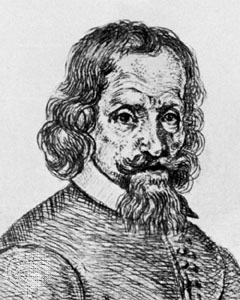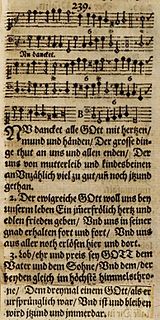Related Research Articles

Johann Rudolf Glauber was a German-Dutch alchemist and chemist. Some historians of science have described him as one of the first chemical engineers. His discovery of sodium sulfate in 1625 led to the compound being named after him: "Glauber's salt".

Andreas Gryphius was a German poet and playwright. With his eloquent sonnets, which contains "The Suffering, Frailty of Life and the World", he is considered one of the most important poets of the German baroque. He was one of the first improvers of German language and poetry.

Jiří Třanovský, was a Lutheran priest and hymnwriter from the Cieszyn Silesia. Sometimes called the father of Slovak hymnody and the "Luther of the Slavs," Třanovský's name is sometimes anglicized to George Tranoscius. Both the Evangelical Lutheran Church in America and the Evangelical Lutheran Church in Canada remember his life and work annually, on the anniversary of his death.

Justine Siegemund or Siegemundin was a renowned midwife from Lower Silesia whose Court Midwife (1690) was the most read, but not the first, female-published German obstetrical manual.

Theodor Friedrich Dethlof Kliefoth was a German Neo-Lutheran. He was born in Körchow, Mecklenburg-Schwerin on 18 January 1810 and he died in Schwerin on 26 January 1895.

Stephan Praetorius was a German Lutheran theologian and pastor.
Abraham von Franckenberg was a German mystic, author, poet and hymn-writer.

"Now thank we all our God" is a popular Christian hymn. Catherine Winkworth translated it from the German "Nun danket alle Gott", written c. 1636 by the Lutheran pastor Martin Rinkart. Its hymn tune, Zahn No. 5142, was published by Johann Crüger in the 1647 edition of his Praxis pietatis melica.

Nicolaus Hunnius was an orthodox Lutheran theologian of the Lutheran scholastic tradition.

Johann Melchior Goeze was a Lutheran pastor and theologian during the period of Late Orthodoxy. From 1760 to 1770 he served as senior of Hamburg presiding as spiritual leader over the Lutheran state church of the city-state.
Thomas Mauksch was a Carpathian German naturalist, botanist, Lutheran pastor, and wine merchant.
Kārlis Balodis was a notable Latvian economist, financist, statistician and demographist. Most notably, he is the author of civilian rationing, which was first used in Germany during the First World War. Balodis has received the Grand Gold Medal of the Russian Academy of Sciences, as well as Dmitry Tolstoy Prize.

"Schmücke dich, o liebe Seele" is a Lutheran hymn in German, with lyrics by Johann Franck and a hymn tune by Johann Crüger. It was first published in Crüger's 1649 Geistliche Kirchen-Melodien, and was later adopted in other hymnals, such as the 1653 edition of his Praxis pietatis melica.

Lucas Bacmeister was a Lutheran theologian and church music composer.

"Die güldne Sonne voll Freud und Wonne" is a Lutheran hymn by Paul Gerhardt. It is a morning hymn which was first published in 1666, with a four-part setting by Johann Georg Ebeling. Gerhardt created an unusual hymn metre for its 12 stanzas.
Georg Mancelius was a Baltic German Lutheran theologian in what is now Latvia. He wrote the first dictionary of the Latvian language. From 1635 to 1636 he was Vice Rector of the University of Tartu and from 1636 Rector.
Heinrich Heshusius was a prominent third-generation German Lutheran pastor, superintendent, and polemicist. He was the second son of Tilemann Heshusius and Hanna von Bert, two well-educated and influential German Lutherans from Wesel on the lower Rhine.

Johann Friedrich Wucherer was a German Lutheran pastor, theologian, author, and co-founder of the Society of Inner Missions with Wilhelm Löhe, based in Neuendettelsau.

Johann Balthasar Schupp was a German satirical author and a writer of Christian lyrics. After 1654, his having switched mid-career to a position as a high-profile Lutheran pastor, the content and populist approach of Schupp's sermons and of the printed pamphlets which he now started to publish brought him into increasingly acrimonious conflict with Hamburg's (relatively) conservative church establishment.

Jacob Stolterfoht was a German Lutheran theologian and leading pastor in Lübeck during and directly following the Thirty Years' War.
References
- ↑ Plutu Vilis (1893), Pauls Einhorns un viņa raksti par latviešiem, Austrums
- ↑ See entry of Paul Einhorn in the Rostock Matrikelportal